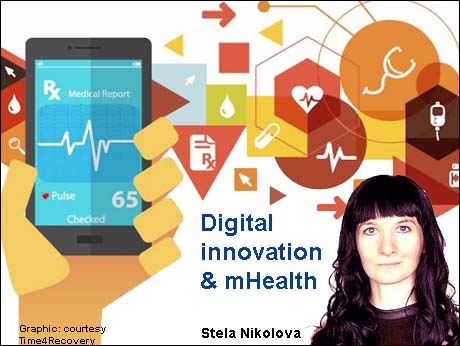
Stela Nikolova looks at the current status of the app publishing activities of the twelve leading Pharma companies
November 1 2017: The digital revolution has transformed the way leading Pharma companies are driving innovation. To leverage the potential of the growing mHealth App market, companies are now using four channels to identify, evaluate, integrate and benefit from digital health solutions: 1) internal app publishing, 2) accelerator or incubator programs, 3) venture fund investments, and 4) direct partnerships.
The 2nd Edition Pharma App Benchmarking 2017 report shows that the internal app publishing still plays the biggest role in adopting the digital innovation in Pharma, yet it has a limited success.
By the end of 2020 the total mHealth market revenue growth will reach $31.3 billion. With the help of mobile apps, and their connected devices and services, Pharma companies are trying to take advantage of this attractive market, foster innovation and further evolve their digital health business success. Currently, Pharma companies are favouring the internal app publishingchannel, as the apps are being developed for the company units and the integration of these apps into their business and operating model is normally high. However, because their own apps are mainly built around the core products of the Pharma and not around the actual market demand, the benefit that companies are getting out of their own apps are low, with a few exceptions. For example, the internal app publishing activities of Johnson & Johnson have been well above average in comparison to other leading Pharma companies. The GSK’s own app publishing activities continue to raise their portfolio size on both iOS and Android platforms. Their app portfolio is unique for the amount of interest paid to children’s health (31% of apps in their app portfolio target children), particularly oral health. Another top player here is Roche. The company has been highly active adding an impressive 116 apps to their app portfolio, reaching 141 apps in Q1 2017.
From 2014 to 2016 there were a few more than 100x digital health deals recorded between leading Pharma companies and 3rd party mHealth companies. Although very popular among the Pharma companies, the accelerator / incubator channel is good during the identification and validation stages of a digital business process, and with a low impact during the integration and the benefit stages. There is a need to invest more time and efforts in the integration process to maximise benefits, otherwise Pharma companies will not benefit enough from 3rd party innovation. Here Bayer is renowned in the world of digital health for its Grants4 accelerator programs and Roche is also using acceletors to source digital innovation.
At present, out of the 12 leading Pharma companies, eleven have invested through their venture / fund/s into a digital health company. The digital investments recorded by Pharma venture funds are often in excess of $5-10M, yet the challenge faced by the companies is how to integrate the new digital health solution into the Pharma core business. The success is limited. The fourth channel used by Pharma companies is a direct partnership with already established and well-known digital health company. The financial and ROI effect of these partnerships will likely be seen in a few years with a mostly a PR impact in the meantime.
While some progress has been made by the leading Pharma companies in relation to these driving digital health innovation channel the success has been limited. Pharma companies haven’t found yet the right mix of channels – right investment strategies to not only access innovation, but also to increase their digital health revenues and market share.
_________________________________________________________________
A blog post "2nd Edition Pharma Report Findings: Chances of leading Pharma companies producing a successful app has decreased from 2.0% (2014) to 0.5% (2016)" some more relevant facts.
* Only 0.5% of all apps published by the leading 12 Pharma companies have managed to achieve annual downloads of over 100K
* All leading Pharma companies have grown their internal app portfolio size since 2014, and all but two (Abbott and Sanofi) have increased their reach
* Novartis, Sanofi and Bayer have made the most significant strides in their app publishing activities, but are not seeing the ROI in the way of market penetration
* Thanks to the growing app portfolio size of Bayer and Novartis, and the high downloads of J&J, half of the leading Pharma companies have portfolios that fall below the average-lines. Previously, this was the case for five companies. Taking J&J as an example, the success of a mere two or three apps can result in Pharma app market leadership.
-------------------------------------------------------------------------------------------------------------
Research2Guidance is a Berlin-based mobile app economy specialist. The company’s service offerings include app strategy consulting, market studies and research.
Link to the full article “The four channels used by Pharma to drive digital innovation with mHealth apps, and why they don't work?"